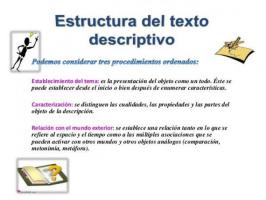PROSE: meaning, characteristics and examples
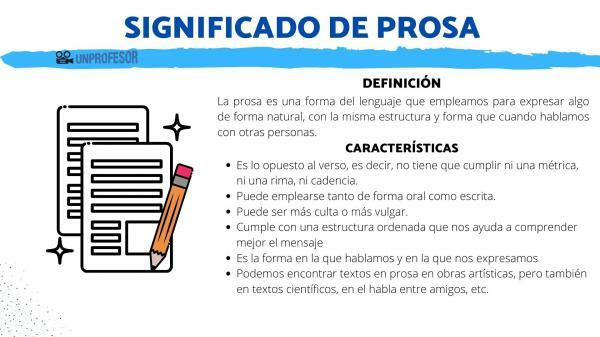
When we study the different types of texts that exists in a language, we find a generic classification that usually encompasses prose texts, on the one hand, and verse texts, on the other. But what exactly is prose? In this lesson from a teacher we are going to delve into this concept so that you can know the meaning of prose, its characteristics and examples that will help you better understand what this great category consists of, in which we include a large number of texts. Take a pen and paper as class begins!
Index
- Prose meaning: what is it
- 6 characteristics of prose
- Types of prose
- Examples of prose
- Differences between prose and verse
Prose meaning: what is it.
We begin the lesson by defining the prose term so that you really know its meaning and we can clarify any questions you may have about it.
Prose is a form of language what do we use for express something naturally, with the same structure and form as when we talk to other people. The term "prose" comes from Latin, specifically, from a Latin expression, "prosa oratio", which refers to the fact that a speech is made in a straight line, that is, a
direct, plain, simple speech.Since ancient times, prose is the type of language we use to communicate thoughts, to convey ideas, to create a speech, and so on. But the fact that it is a simple type of discourse does not mean that it cannot be used in the field of art or literature, on the contrary: the narrative genre, one of the most important today, uses prose to tell their stories and describe the actions that the characters perform.
But, in addition to being in the world of art, prose is also part of other discourses such as, for example, the journalism, oratory, philosophical texts, scientists, etc. The word is used in a simple and direct way to communicate a message to the receiver.
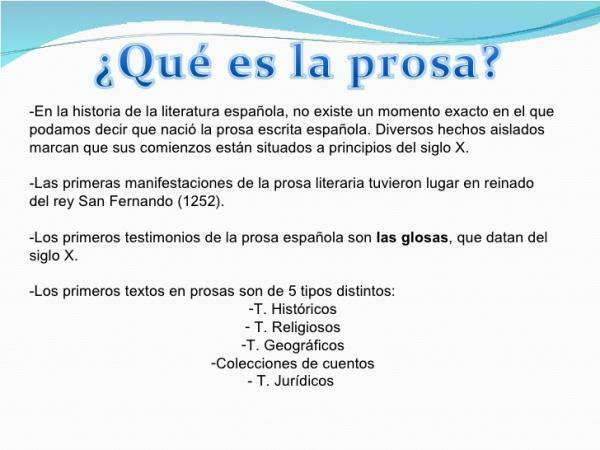
6 characteristics of prose.
Now that you know the meaning of prose, we are going to discover the most outstanding characteristics of this use of language so that, in this way, you can finish understanding what prose is exactly.
The outstanding prose features are as follows:
- It's the opposite of the verse, that is, it does not have to comply with a metric, a rhyme, or a cadence. It has absolute freedom of form.
- It can be used both of oral and written form.
- Depending on the field in which we use prose, it can be more cultured or more vulgar. For example, if we make a speech for an academic environment we will use elevated prose; On the other hand, if we are going to speak with adolescents or children, we will use a lower level of the language adapted to our interlocutors.
- Another characteristic of prose is that it complies with a neat structure that helps us better understand the message and make it easy to receive. To do this, he uses the words syntactically and organizes the message depending on the content and purpose of his intervention.
- It's the way we talk and in which we express ourselves in our day-to-day life, for that reason, prose is gaining more and more ground to verse in the contemporary cultural sphere.
- We can find prose texts in artistic works, but also in scientific texts, in speech between friends, etc.
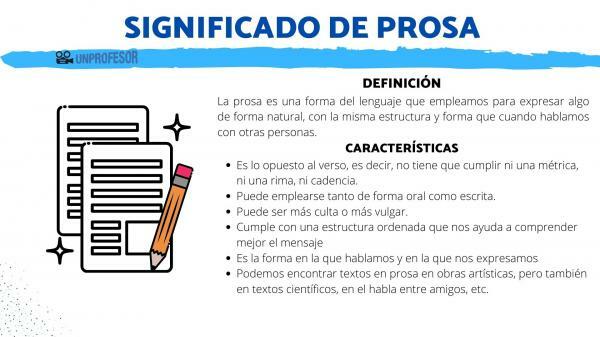
Types of prose.
At this point it is important that we stop for a moment to learn about the different types of prose that exist. And, as you have seen, we use this type of language at all times and, therefore, Experts have created this classification that helps us to be able to differentiate the different types of prose that exist.
Colloquial prose
It is the simplest and simplest speech. It is the way we talk with our mother, with our friends, but also with our bosses or our superiors.
Literary prose
Within literature, there are a large number of literary genres that use prose. Here we leave you some of the most obvious and clear:
- Narrative. It is the prosaic genre par excellence. The narrator tells us a story through a simple and direct speech, without rhyme, melody, cadence ...
- Dramatic. Of course, theater is another genre in which prose abounds. And the thing is that theater is the space in which reality is represented in an artistic way; For this reason, current playwrights are committed to using a closer and more natural language, that is, in prose. Let us remember that the Golden Age theater it is characterized by, precisely, the opposite: the authors wrote in verse because, at that time, verse was considered to be the favorite and cultured way of making literature.
- Poetic prose. Yes. There is also poetic prose and, in fact, it has more and more writers. It is a mixture of the two styles, but without the text having rhyme, meter or, ultimately, the form of poetry. What is poetic is the attitude of the speaker, the subject, the way of approaching it, etc., but it is still a prose text.
Non-literary prose
Finally, we must not forget that prose is part of allnon-literary textsthat are published; and that is, a scientific treatise will never be written in verse because it would make it difficult to assimilate concepts and receive the message.
In this sense, there is a great variety of examples of texts in non-literary prose such as, for example:
- Journalistic texts
- Didactic texts
- Scientific texts
- Technical texts
- And a very long etcetera
Examples of prose.
So that you finish understanding the concept of prose and its meaning, here are some examples that will better clarify everything that we have commented previously. We will propose examples of different types of prose So that you can also see the differences between them.
Examples of colloquial prose
"Hi Mom, I haven't written to you in a long time, but I didn't know where to start. The truth is that we are very well, we are happy, but tired and wanting to get home now. Think that, in less than a week, we will be together again and we can prepare that delicious broth that you make at Christmas, do you think? "
Examples of literary prose
We have an enormous amount of prose examples in literature, in fact, all novels What are you currently reading? written in prose. We leave you here some fragments:
“When man is left alone and closes his eyes to the future, to dreams, the terrifying abyss of eternity is revealed to him. Eternity is not the future. When we die, death turns us around in our orbit and we begin the march backwards, towards the past, towards what was. ”
This would be an example of poetic prose written by Unamuno.
"I followed my father through that narrow path, more of a scar than a street, until the glow of the Rambla was lost behind us. The light of dawn filtered in from balconies and cornices in slanted puffs of light that did not touch the ground. Finally, my father stopped in front of a carved wooden gate blackened by time and humidity. In front of us loomed what seemed to me the abandoned corpse of a palace, or a museum of echoes and shadows. "
This would be an example of narrative prose, written by Carlos Ruiz Zafon.
Examples of non-literary prose
We also have a huge amount of examples of this type of prose, since it is what we read when we do not read a literary work. For example:
"The Ministry for the Ecological Transition has started, in coordination with the Government Delegation in the Balearic Islands and the Balearic Government, the actions to monitor this Pacific gray whale, "seriously ill and lost" that has landed in the waters of a cove of Majorca. Wally the whale has been wandering the Mediterranean for weeks without succeeding in its attempt to regain a lost course. "
This is the fragment of a journalistic news, but we have many other examples of non-literary prose in a large number of writings: history books, philosophy books, technical books, political pamphlets, and so on.
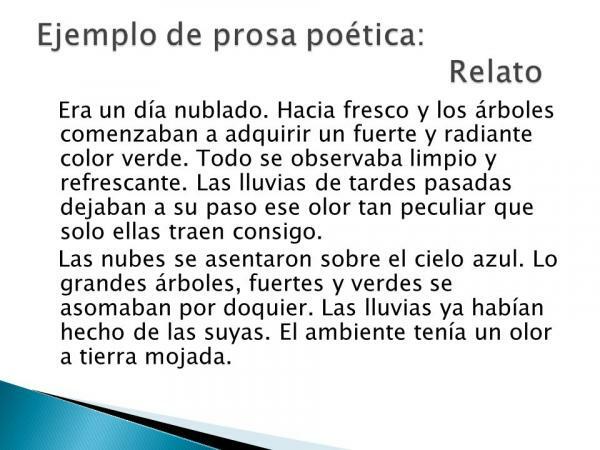
Differences between prose and verse.
We could not finish this lesson on the meaning of prose, characteristics, and examples without put it next to its opposite: the verse. And it is that with a comparison between both forms, surely it ends up being completely clear to you what prose is.
The differences between verse and prose are as follows:
- Prose is not subject to rules or a specific form; the verse yes.
- In the verse we find elements such as rhythm, measure, cadence; not in prose.
- Prose is the form of language we use to speak; the verse no.
- Prose can be used in all text formats that want to convey an idea; the verse not because it could confuse the reader and that the message would not finish being clear.

If you want to read more articles similar to Prose: meaning, characteristics and examples, we recommend that you enter our category of Writing.
Bibliography
- Pizarnik, A. (2016). Complete prose. Lumen.
- Vallejo, C. (2010). Poems in Prose (Vol. 136). Linkgua.
- Torremocha, M. V. OR. (1999). Prose Poem Theory (No. 12). Sevilla University.
- Cernuda, L., Harris, D., & Maristany, L. (1994). Prose ii. Siruela Editions.

